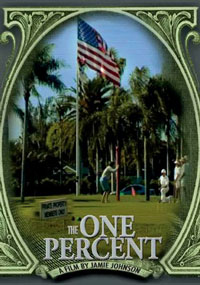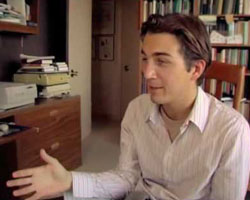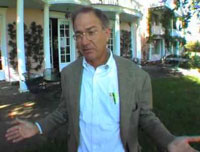 “The One Percent” is about the richest of the rich in America, the 1% of people who control over half of the country’s wealth, and who keep getting richer and richer, helped along by friendly legislators and tax codes. It’s about the gap that exists between everyday Americans and the ultra-rich.
“The One Percent” is about the richest of the rich in America, the 1% of people who control over half of the country’s wealth, and who keep getting richer and richer, helped along by friendly legislators and tax codes. It’s about the gap that exists between everyday Americans and the ultra-rich.
At the beginning of the movie, the young filmmaker is getting ready to crash a high-class croquet game at some country club. I figured this would be a Michael Moore kind of movie, with the documentarian squirming his way into places where he doesn’t belong.
But then we find out–Jamie Johnson, the filmmaker, DOES belong at that croquet club. He’s an heir to the Johnson & Johnson fortune, a grandson of the founder. Which makes it all the more interesting. But it’s a different movie than what I thought it would be.
Johnson spotlights the gap between the ultra-rich and the poor. But only for a bit. The film is more about rich guilt, perhaps his own guilt at being born wealthy.
Johnson interviews some high-powered people: Milton Friedman, Bill Gates Sr., Steve Forbes, Adnan Khashoggi, and other wealthy men. It’s fascinating to hear them reflect on their wealth, and to bare some uncomfortable feelings about it.
But the most interesting interviews are with two children of privilege who have chosen an ordinary life: Nicole Buffet, a granddaughter of Warren Buffet; and a grandson of Oscar Meyer.

Jamie Johnson
Nicole Buffet works as a nanny for a rich family in California–a family which no doubt has far less wealth than the Buffets. She’s also a wannabe artist, and she lives a very normal life. The movie cemented that: by appearing in the movie, Warren Buffet disowned her, totally cut her out of his life. It’s really a sad commentary on Buffet, a man she loves and admires.
The grandson of Oscar Meyer (I can’t remember his name) is even more interesting. He, too, lives an ordinary, middle-class life. When it came time to inherit his fortune, he told his father that he was going to give it all away. He didn’t want it. This is a guy who seemed so grounded, and articulate, that I would love to spend time talking to him.
Johnson also interviews his father, sometimes in the company of their longtime financial advisor (who STRONGLY opposed the movie). His parents are both against their son doing this movie. At the least, they would prefer to be left out of the movie. And yet, they seem like very good people, likable folks, unpretentious. They wanted to be supportive of their son, yet valued the privacy he was intent on invading.

Jamie Johnson's father
There is a great backstory. Jamie Johnson’s father once made a documentary himself, about hunger in South Africa during the apartheid days. The Johnson & Johnson company was mentioned in the film. He got raked over the coals by the company, and the scars of that experience clearly linger. At one time, he was an idealistic young filmmaker; now he lives the life of a wealthy heir.
Toward the end, the father finally agrees to talk on camera with his son, who then asks him what happened years ago with the film he made. He begins telling the story, and just as it’s getting very very interesting, he quits. He doesn’t want to say more. Why? It’s hard to tell, and we’re left with no answers.
This is not the movie I was expecting, a movie about the rich-poor gap. It was somewhat about that, but much more about rich guilt. About the ambivalence some rich people feel about their wealth. It’s not a great movie by any means; I found Jamie Johnson to be a terrible interviewer. I think it was as much about his own rich guilt as anything, and I wonder if his idealism resulted in anything beyond this movie, or was just a fleeting thing.






2 Comments to Movie: The One Percent (Documentary)